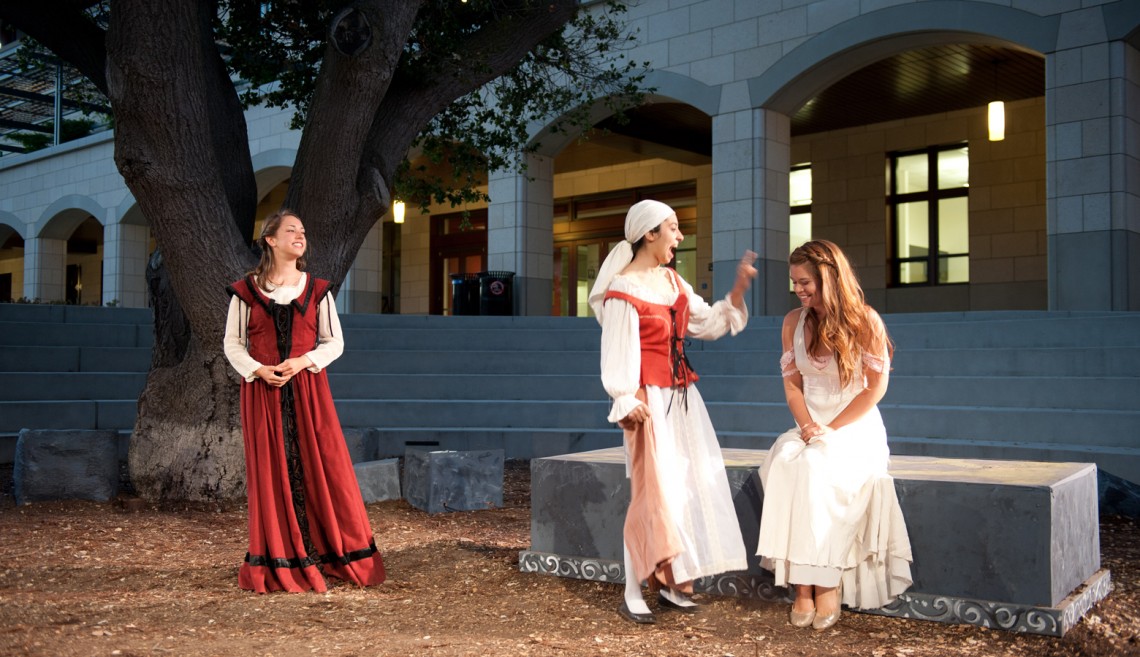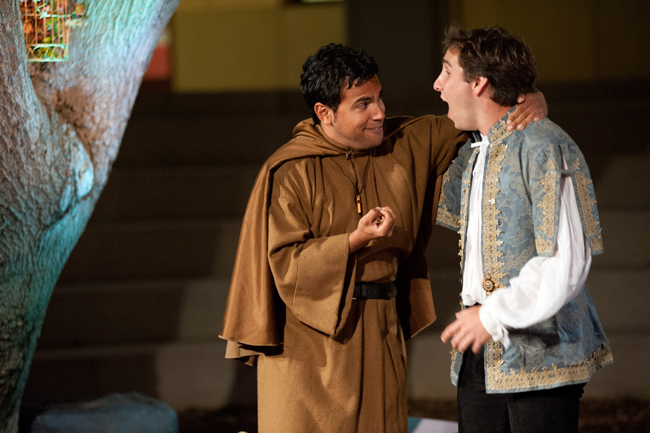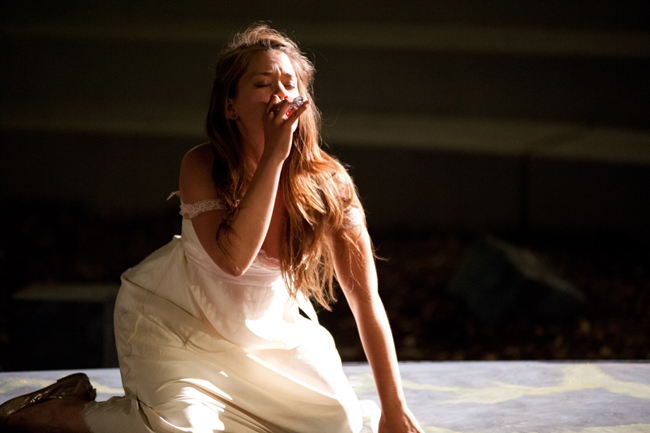 Daniel Chia, '13
Daniel Chia, '13
Stanford Shakespeare Company’s Romeo and Juliet brings the feuding families of Verona together for a eulogy
The all-student theater company tweaks the classic tale by staging a ceremony of remembrance for the dead lovers.
The idea of a family feud forever was never truer than in the presentation of Romeo and Juliet by the Stanford Shakespeare Company tonight through Sunday, May 23-27. The company adds new life and longevity to the familiar Montague vs. Capulet tragedy by staging the play as an evocation of the spirits of the doomed lovers by the two clans’ descendants.
Five outdoor performances of the play are scheduled in the Science and Engineering Quad on the Stanford campus. The play begins at 8 p.m. each night – except on Saturday, when it starts at 7 p.m. The production is free but reservations are strongly suggested, as seating is limited and StanShakes has a loyal following.
For never was a story of more woe
The Tragedy of Romeo and Juliet is perhaps the world’s most famous tale of doomed romance, following two young lovers to their fates. The StanShakes production invites the audience to something more like The Eulogy of Romeo and Juliet. The actors will explore what has happened instead of what will happen.
The company’s production was conceived as a kind of remembrance ceremony. It takes place after the lovers have died and their ghostly echoes are being called forth by their descendants to retell the tale. Director Evan Dragic, ’12, has changed the gender of some of the key supporting players and underscored the father-son relationship between Romeo and Friar Laurence, but the bones of the story remain intact. Light through yonder window still breaks and you get your balcony scene, albeit in a tree.

Daniel Chia, ’13
“Revisiting such a well-known love story with the lovers’ ultimate fate – death – in mind throughout the show brings the performance of the piece to life in so many new ways,” said Camille Brown, ’14, who is playing Juliet. “For me, the piece became more alive with this focus because I knew that in the moments I had as a living presence onstage, I had to do my best to convince the audience to genuinely invest in the love story of Romeo and Juliet before our fate caught up with us.”
The company claims some of Stanford’s top student-actors, but not all of them are drama majors. In fact, of the approximately 30 actors and techs, drama students are in the minority.
There is something more than the facts that are worth caring about in this play. The company’s the thing.
The Stanford Shakespeare Company is renowned for creating entertaining, innovative and accessible productions, and has been for decades. Its winter production of The Taming of the Shrew was performed in the style of commedia dell’arte, allowing the clowning to serve as social commentary on the subject matter. Its original take on Romeo and Juliet keeps the Bard’s story fresh for new audiences and Shakespeare groupies alike.
The student-run repertory theater troupe hosts company auditions and tech interviews at the start of the school year, building a committed company for the whole year. In-house auditions for the winter and spring productions happen at the same time to ensure that all the actors and techs have a balanced season, which means if someone has a big role in the winter he’ll have a smaller role in the spring, or a medium-sized role in each production.
“We do this first so that nobody gets burned out, but also because as a company we want everyone to have a chance to take a lead role, whether on- or off-stage,” said company executive producer Caroline Chen, ’12.
The company claims some of Stanford’s top student-actors, but not all of them are drama majors. In fact, of the approximately 30 actors and techs, drama students are in the minority. The company members’ time and effort are not rewarded by grades or credits; rather, those who are devoted to the study and performance of Shakespeare do it for the love of theater.
Chen explained what she loves about StanShakes and what sets it apart from other performance groups: “Every year we take a couple of techs who have never done theater before. For example, Evan Dragic, who is the director for Romeo and Juliet, came to the company his sophomore year as a blank slate. We also have actors join who have never acted Shakespeare before.”
Dragic added, “Our ensemble is made up of ridiculously talented actors, whether they are drama majors or not. Although they are pursuing different academic paths here at Stanford, it is wonderful to see them stay in touch with their love of, and gifts for, theater. For example, last quarter the actor who played Petruchio in Taming of the Shrew, Tim Borgerson, was doing his first full-scale Shakespeare production, and one of his first theatrical productions ever, and it was amazing seeing how he and so many others launched themselves into the project with such intensity and dedication.”

Daniel Chia, ’13
“Producing, stage managing, and technical directing all take an enormously different meaning when working with students,” said producer Vanessa Gallegos, ’13. “When the entire company is responsible for the set and the props and the costumes, the stress levels rise. However, when you are finally done with the entire production and strike, you realize that you have never felt more relieved or more accomplished.”
O! she doth teach the torches to burn bright
StanShakes members are aware of the difficulty in learning and teaching Shakespeare and they make it part of their mission to “bring the joy of Shakespeare to students and youth as the Bard intended it – not as a script, but as a show to be seen and heard.”
The company creates teaching workshops for school-age students on the Peninsula that include staged readings and critiques of monologues and scenes. In addition to her acting role as Juliet, Brown is also the education outreach coordinator.
She described the company’s approach to teaching Shakespeare: “We have had the opportunity to workshop scenes with students ranging from ages 7 to 17 years old. A typical workshop format involves a free session of acting exercises, text analysis with some of the company’s actors and a lot of improv explorations.”
“Our outreach program is phenomenal,” added Mary Glen Fredrick, ’12, the company artistic director. “It’s amazing to see how the high school students who start out adamantly against Shakespeare can, in a one-hour workshop, do a total 180 and love watching or participating in the scenes being performed.”
